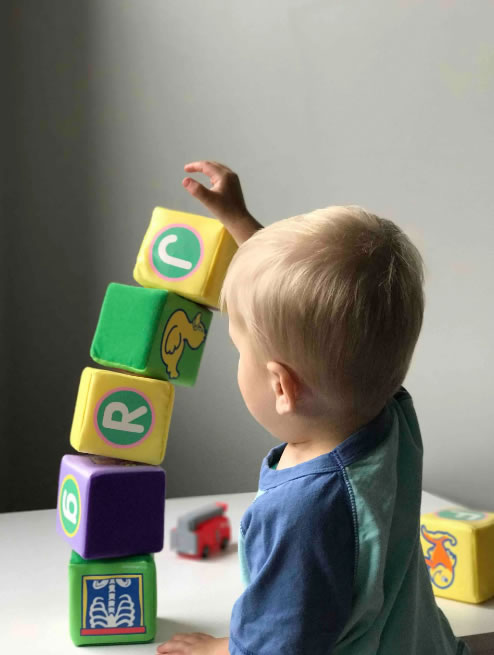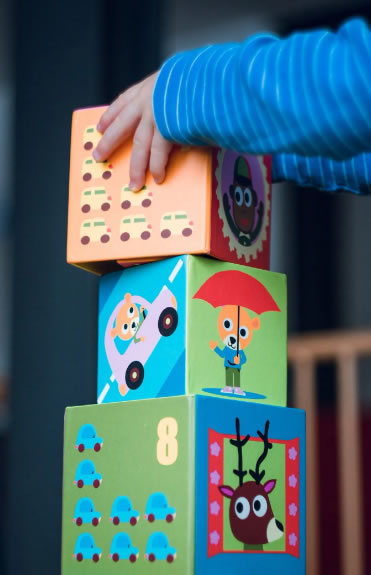OCCUPATIONAL THERAPY
WHAT IS OCCUPATIONAL THERAPY?
Occupational Therapy (OT) is a regulated health profession which helps individuals to maximize their level of independence in everyday activities. OTs are licensed practitioners with the College of Occupational Therapists of Ontario. All of our staff receive ongoing training specific to working with children and youth with a variety of needs to ensure quality services for them and their families. Occupational therapists help develop the skills needed to participate as independently as possible in daily routines through the use of therapeutic strategies and adapted activities.
Occupational therapists work directly with children, youth, and their caregivers to improve the child's functional abilities to engage in:
- Productivity (school and school readiness, work, and pre-vocational skills)
- Self-care (self-care, safety, feeding, dressing, personal hygiene and organizational skills)
- Leisure activities (individual and social/group play, and participation in community activities)
At THRIVE, Occupational Therapists provide services for children and youth from birth to 19 years of age for a variety of needs.

SERVICES
Direct Therapy
Either individual or groups, offered by a therapist or therapy assistant.
Monitoring
The therapist trains someone else involved with the child/youth on a more regular basis to carry out the Occupational Therapy plan. The therapist is in regular contact with the person who carries out the program.
Consultation
Consultation with parents, caregivers, daycare staff, school staff, etc. to address the needs identified in the assessment and to help the client develop the skills to achieve their goals.
Clinics
Occupational Therapists are involved in a number of clinics at the Thrive Child Development Centre including:
Orthopedic
Orthotic
Botox
Neuromuscular
Education
Education and training for families, school personnel, and caregivers on gross motor programs, the use of equipment, safe lifting, and other related issues.
Home Programs
Home programs for use by parents, caregivers, daycare staff, and school staff.
WHAT CAN THE OCCUPATIONAL THERAPIST PROVIDE?
Upon referral, an occupational therapist will work together with you and other team members to get to know your child/youth and family and determine how to help promote development and encourage participation in daily activities. The OT works closely with the child/youth, the family, caregivers, and other health care professionals to establish individualized therapy goals and treatment plans.

ASSESSMENT / ELIGIBILITY
The Occupational Therapist will assess your child/youth and assist you and other caregivers (ie, teachers, in-home workers) to understand their strengths and growth areas. Therapists may use a combination of clinical observations and standardized assessments to gain information regarding your child/youth’s abilities. The OT may evaluate a number of skills areas as needed, which may include:
- Fine motor
- Visual motor
- Visual perception
- Sensory motor
- Self-care
- Self-regulation
- Social Skills
- Community participation
The OT may also look at the physical accessibility of your child/youth’s environment (home and/or school) and determine if there is a need for adaptive equipment or modifications (ie, bath seats, ramps).
INTERVENTION
Intervention will look different depending on the age and unique needs of your child. At THRIVE we focus on early intervention. The focus of our core services are for children before they enter school. Once a child enters school, their home-based occupational therapy needs are most often supported in a clinic model. Most of our clinics begin with education for parents and then follow up consultation strategies to help families implement strategies within the home.
EQUIPMENT
Occupational Therapists may recommend a variety of commercially available or custom made adaptive equipment to allow your child to participate as independently as possible in their daily routines. The OT will assess your child’s equipment needs and recommend the most appropriate equipment available. These may include:
- Pencil grips
- Adapted scissors
- Splints
- Slant boards
- Adaptive classroom chairs
- Ramps
- Grab bars
- Bath seats
- Toileting aids
- Mechanical/electrical lifts
- Feeding aids
If purchase is required, the OT can assist with seeking an appropriate vendor and/or with seeking funding assistance as needed.

OCCUPATIONAL THERAPY CLINICS
SENSORY CLINIC
This clinic is for children and their families who are struggling to manage and to respond to information that they are receiving through their senses. This issue must be resulting in the child's having difficulty participating in daily routines and tasks at home or in the community. Families interested in this clinic first receive some education about sensory issues. After the education, a sensory assessment is completed and then the family and Occupational Therapist collaborate on 1 or 2 of the family's main goals related to this area.
CONSULT CLINIC
This clinic is for children and families that are struggling with one or two occupational therapy related goals. The clinic is strengths based and works closely with the child and family to address the family's goals. Typically this clinic is 4–6 consultative sessions. Children are discharged once the plan is complete but can refer again for future needs.
FEEDING CLINIC
The Feeding Clinic team consists of two Speech-Language Pathologists and two Occupational Therapists. Services offered include assessments, 1:1 intervention and consultation, and parent education. *Referrals to the Feeding Clinic can be made by physician, paediatrician, or family.
This clinic should be considered if a child has:
- Suspected aspiration due to history of recurrent pneumonia or chest infections
- Requires a Modified Barium Swallow Study as referred by paediatrician
- Difficulty swallowing as a result of a sudden change in medical status
- Sudden refusal of previously accepted foods putting the child at risk for dehydration or weight loss
- Re-establishing oral feeding after a recent hospitalization or change in g-tube status
- Motor or neurological involvement impacting ability to eat
- Difficulties meeting nutritional needs and is younger than 12 months
- Less growth than expected as assessed by a physician
- If your child is a ‘Problem Feeder’:
- Restricted range or variety of foods, usually less than 20 different foods
- No longer eats foods he/she used to like and does NOT re-acquire them within 4-5 weeks (i.e., food jags)
- Refuses entire categories of food textures
- Eliminates an entire food category based on the Canada food guide (i.e. meats and alternatives)
BOTOX CLINIC
Botox is a temporary neurotoxin that is injected into overactive muscles to relax them. This clinic can benefit children or youth who have increased muscle tone that affects their function and or results in increased pain. This clinic runs monthly and a physiotherapist, occupational therapist, and a paediatrician are all involved in the assessment.
SEATING AND MOBILITY CLINIC
This clinic supports children and youth who require equipment or devices for their everyday mobility. We can provide assessment and prescriptions for the following devices: walkers, standing frames, and manual or electric wheelchairs.
ASSISTIVE COMMUNICATION AND WRITING AIDS (ACWA) CLINIC
This clinic is for children or youth whose verbal speech is not able to meet their everyday needs. Once a referral is made, a Speech and Language Pathologist conducts an assessment to determine what kinds of devices or tools will best support the communication needs and abilities of the child. We are able to prescribe devices locally if the child or youth is capable of using their hands to touch a screen or point at a picture. Children or youth who may struggle to do this are referred to the Sudbury team, and we will work collaboratively to match the best technology to meet the needs of the individual child.

